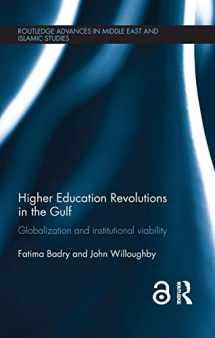
Higher Education Revolutions in the Gulf: Globalization and Institutional Viability (Routledge Advances in Middle East and Islamic Studies)
ISBN-13:
9780415505659
ISBN-10:
0415505658
Edition:
1
Author:
John Willoughby, Fatima Badry
Publication date:
2015
Publisher:
Routledge
Format:
Hardcover
236 pages
FREE US shipping
Book details
ISBN-13:
9780415505659
ISBN-10:
0415505658
Edition:
1
Author:
John Willoughby, Fatima Badry
Publication date:
2015
Publisher:
Routledge
Format:
Hardcover
236 pages
Summary
Higher Education Revolutions in the Gulf: Globalization and Institutional Viability (Routledge Advances in Middle East and Islamic Studies) (ISBN-13: 9780415505659 and ISBN-10: 0415505658), written by authors
John Willoughby, Fatima Badry, was published by Routledge in 2015.
With an overall rating of 3.9 stars, it's a notable title among other
books. You can easily purchase or rent Higher Education Revolutions in the Gulf: Globalization and Institutional Viability (Routledge Advances in Middle East and Islamic Studies) (Hardcover) from BooksRun,
along with many other new and used
books
and textbooks.
And, if you're looking to sell your copy, our current buyback offer is $0.3.
Description
Over the past quarter century, the people of the Arabian Peninsula have witnessed a revolutionary transformation in higher education. In 1990, there were fewer than ten public universities that offered their Arabic-language curricula in sex-segregated settings to national citizens only. In 2015, there are more than one hundred public, semi-public, and private colleges and universities. Most of these institutions are open to expatriates and national citizens; a few offer gender integrated instruction; and the language of instruction is much more likely to be in English than Arabic. Higher Education Revolutions in the Gulf explores the reasons behind this dramatic growth. It examines the causes of the sharp shift in educational practices and analyses how these new systems of higher education are regulated, evaluating the extent to which the new universities and colleges are improving quality. Questioning whether these educational changes can be sustained, the book explores how the new curricula and language policies are aligned with official visions of the future. Written by leading scholars in the field, it draws upon their considerable experiences of teaching and doing research in the Arabian Gulf, as well as their different disciplinary backgrounds (linguistics and economics), to provide a holistic and historically informed account of the emergence and viability of the Arabian Peninsula’s higher education revolutions. Offering a comprehensive, critical assessment of education in the Gulf Arab states, this book represents a significant contribution to the field and will be of interest to students and scholars of Middle East and Gulf Studies, and essential for those focused on higher education.


We would LOVE it if you could help us and other readers by reviewing the book
Book review

Congratulations! We have received your book review.
{user}
{createdAt}
by {truncated_author}


